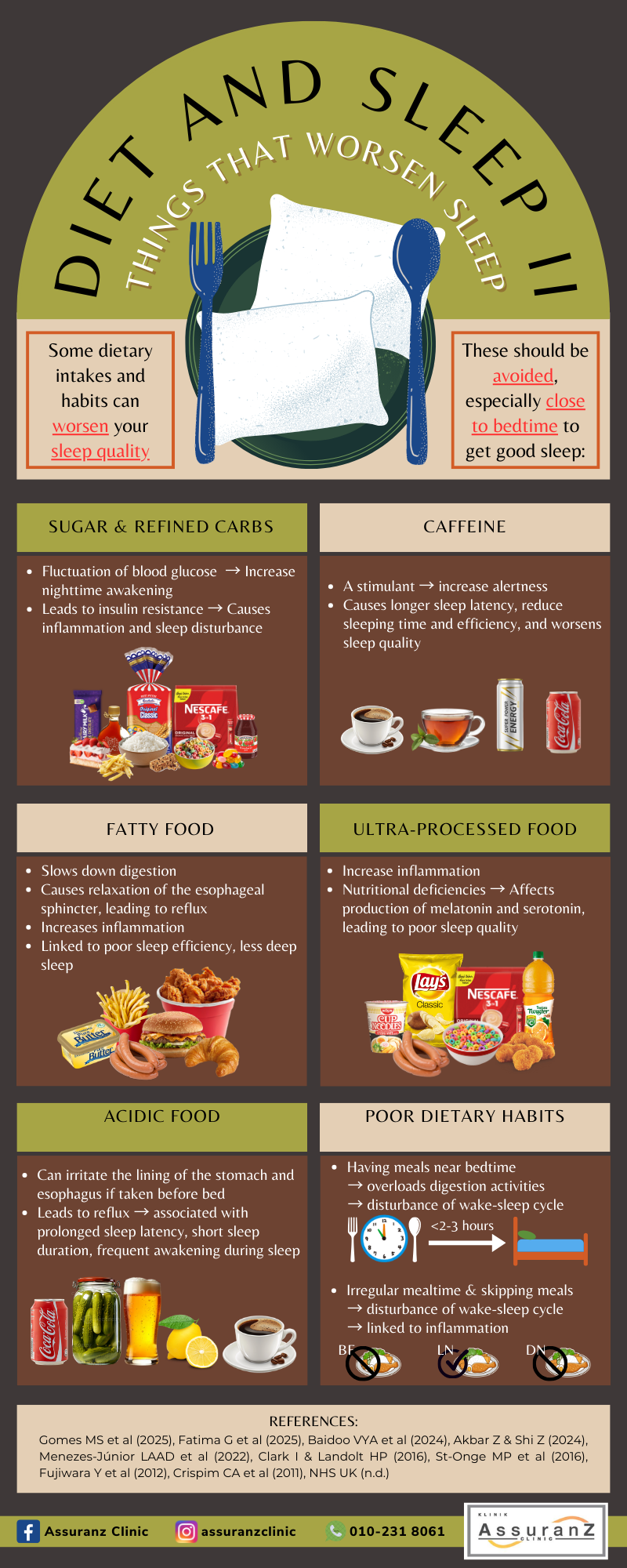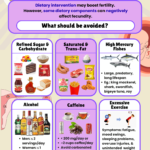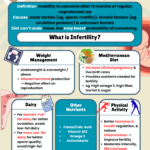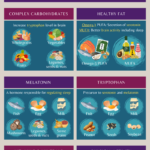In the previous article, it’s established that diet can improve the quality of sleep. However, did you know that some dietary intakes and habits can worsen your sleep quality? In this article, we will delve into those intakes and habits that can negatively affect sleep quality.
在上一片文章中,我们已经探讨饮食对提升睡眠质量的积极作用。然而,你是否了解,某些饮食摄入和生活习惯实际上可能对睡眠产生不利影响?本文将深入分析那些可能对睡眠质量产生负面影响的饮食和习惯。
Dietary intake and habits which can worsen sleep quality:
降低睡眠质量的饮食因素与行为习惯
- Sugar & refined carbohydrates
糖与精制碳水
Some studies show that sugar and high carbohydrate intake in general can improve wake-to-sleep transition due to increase in insulin levels, which in turn elevates the tryptophan level in the brain resulting in the increase melatonin and serotonin production. However, consuming high sugar and carbohydrates, especially close to bedtime, can cause sleep disturbance by increasing night awakening during sleep. This is possibly due to fluctuation of blood glucose that can lead to an increase in cortisol and adrenaline, causing disturbance in core body temperature regulation and reduced secretion of night-time melatonin. Chronic consumption of high sugar and refined carbohydrates can also lead to insulin resistance, further causing inflammation and sleep disturbance. Some sources of refined carbohydrates include white rice, white bread, and white flour.
有研究显示,糖分和高碳水化合物的摄入在一定程度上有助于从清醒过渡到睡眠状态,这是因为它们能提高体内胰岛素水平,进而促进大脑中色氨酸的摄取,提升褪黑激素与血清素的生成。然而,尤其是在临近睡前摄入高糖和高碳水食物,可能会引发夜间觉醒等睡眠障碍。这可能与血糖水平的波动有关,血糖波动会刺激皮质醇与肾上激素的分泌,进而影响核心体温调节,并抑制夜间褪黑激素的正常分泌。长期大量摄入糖分和精制碳水化合物还可能导致胰岛素抵抗,诱发体内炎症反应,进一步干扰睡眠质量。常见的精致碳水来源包括白米、白面包和精制面粉等。
- Caffeine
咖啡因
Caffeine is a stimulant which can increase alertness. It works by competing with adenosine, a compound that accumulates throughout the day and signals the need for sleep in the brain, therefore keeping a person awake. Research states that caffeine can cause longer sleep latency, reduce sleeping time and efficiency, and worsens sleep quality. Thus, excess caffeine consumption of more than 500 mg per day should be avoided. Caffeine can be found in various food products such as coffee, tea, cocoa, carbonated drinks and energy drinks.
咖啡因是一种中枢神经兴奋剂,能够增强警觉性。它通过与腺苷竞争受体发挥作用。腺苷是一种在清醒状态下逐渐累积、并向大脑传递“需要睡眠”信号的化合物。咖啡因的存在会阻断这一信号,从而使人保持清醒。研究显示,咖啡因可能延长入睡时间(入睡潜伏期)、缩短总体睡眠时间、降低睡眠效率,并且削弱整体睡眠质量。因此,应避免每天摄入超过500毫克的咖啡因。咖啡因广泛存在于多种食物和饮料中,包括咖啡、茶、可可、碳酸饮料及能量饮料等。
- Fatty food
高脂食物
High fat intake, precisely later in the evening or during dinnertime is associated with poor sleep efficiency, less deep sleep and longer time to fall asleep upon awakening during sleep. This is possibly due to its effect on the gastrointestinal system, as it can slow down digestion in the stomach and can cause relaxation of the esophageal sphincter, leading to reflux. Long term high consumption is also linked to inflammation, which can affect sleep efficiency. High fat food like fast-food, deep-fried food, cake, pastries et cetera should be avoided near bedtime.
晚间或晚餐时摄入高脂肪食物与睡眠效率降低、深度睡眠减少以及入睡时间延长有关。这可能与高脂饮食对胃肠系统的影响有关,因为脂肪会延缓胃部消化速度,并导致食管括约肌松弛,增加胃食管反流的风险。长期大量摄入高脂肪食物还可能引发体内炎症,进一步影响睡眠效率。快餐、油炸食品、蛋糕、糕点等高脂食物应尽量避免在临睡前食用。
- Ultra-processed food
高度加工食品
Ultra-processed foods (UPF) is highly processed food with little to no real food ingredients, typically associated with high energy density, added sugars, sodium, saturated fat, trans fat, refined carbohydrates and additives, made for convenience and for palatability. Studies suggest that high consumption of UPF can lead to poor quality of sleep. This is possibly due to its contribution in increasing inflammation. High UPF diet is also associated with nutritional deficiencies, as it is commonly low in essential nutrients like magnesium, zinc, vitamin B and vitamin D, all of which plays crucial roles in sleeping regulation. UPF such as chips, confectionaries, patties, sausages and instant noodles therefore should be avoided.
高度加工食品(Ultra-processed foods, UPF)是指经过高度工业化处理、几乎不含真实食材的食品,通常具有高能量密度,并含有大量添加糖、钠、饱和脂肪、反式脂肪、精制碳水化合物以及各种食品添加剂。此类食品主要是为了方便性和可口性而设计。研究表明,摄入大量高度加工食品可能导致睡眠质量下降,这可能与其促发体内炎症反应有关。此外,高度加工食品通常缺乏如镁、锌、维生素B和维生素D等对睡眠调节至关重要的必需营养素,因此也与营养缺乏相关。因此,应尽量避免摄入如薯片、糖果、肉饼、香肠和方便面等高度加工食品。
- Acidic food
酸性食物
Particularly for those with acid reflux or heartburn, acidic food can irritate the lining of the stomach and esophagus especially if taken before bed. This in turn will trigger or worsen the problem. Research shows that reflux is associated with sleep issues, including prolonged sleep latency, short sleep duration, frequent awakening during sleep, and poor sleep quality. Examples of acidic foods are coffee, citrus fruits, soda, vinegar, pickles and some processed foods.
对于有胃酸倒流或胃灼热问题的人来说,酸性食物尤其需要注意。这类食物可能刺激胃和食道粘膜,尤其是在临睡前摄入时,更容易引发或加重症状。研究表明,胃酸倒流与睡眠障碍相关,包括入睡时间延长、睡眠时间缩短、夜间频繁醒来以及整体睡眠质量下降等问题。常见的酸性食物包括咖啡、柑橘类水果、碳酸饮料、食醋、腌制食品以及部分加工食品。
- Having meals near bedtime
睡前进食
Taking meals near bedtime can reduce sleep quality. This may be due to increased stomach volume leading to discomfort and thereby causing a rise in wake-to-sleep transition time. Physiologically, when humans sleep, the activity of the digestive tract reduces, and consumption of food right before sleep can cause an overload of gastrointestinal activities, leading to lower sleep quality. Apart from that, circadian (wake-to sleep) cycle can also be disrupted as when food is consumed at an inappropriate time as meal is also one of the synchronizing signals of some tissues of circadian clocks. Therefore, it is recommended that food consumption should be stopped about three hours before bedtime.
临睡前进食可能会降低睡眠质量。这可能与胃内容物增加引发的不适感有关,进而延长从清醒状态过渡到睡眠状态的时间。从生理角度来看,人体在进入睡眠后,消化道的活动会显著减弱;若在睡前进食,可能导致胃肠道负荷增加,影响其正常节律,从而导致睡眠质量下降。此外,不当时间的进食还可能干扰人体的昼夜节律(即睡眠-清醒周期),因为进食行为本身也是某些部分组织中生物钟的重要同步信号之一。因此,建议在睡前至少三小时停止进食,以促进良好的睡眠质量。
- Irregular meals & skipping meals
饮食不规律与漏餐
Poor dietary habits like irregular mealtime and skipping meals is strongly associated with compromised sleep quality according to research. As previously mentioned, mealtime is also one important synchronizing signals for circadian cycle. Irregular and skipping meals lead to circadian disruption, therefore causing low sleep quality. Aside from sleep, these dietary habits are also linked to inflammation and higher risk of metabolic diseases such as obesity, diabetes and cholesterol. Thus, one should take regular meals with proper timing. Ideally, breakfast should be taken about 2 hours after waking up, and lunch should be taken about 5 hours after breakfast. Dinner should be taken 3 to 4 hours before bedtime.
研究表明,不良的饮食习惯,如进餐时间不规律或经常跳过正餐,与睡眠质量下降有着密切的关联。如前所述,进餐时间是调节昼夜节律的重要同步信号之一。进餐不规律或跳餐可能导致生物节律紊乱,继而影响睡眠质量。除了对睡眠的不利影响,这类饮食模式还与体内炎症反应增加及代谢性疾病风险上升有关,例如肥胖、糖尿病和高胆固醇等。因此,建议保持规律的饮食习惯,合理安排每日三餐的时间。理想的进餐安排为,早餐应在起床后约2小时内食用,午餐则应在早餐后约5小时进食,而晚餐建议安排在睡前3至4小时之间。
All in all, we should try to make conscious efforts to achieve the best quality of sleep. This is crucial as sleep is a component of life that can affect our physical and mental wellbeing.
总的来说,我们应有意识地努力提升睡眠质量。睡眠作为维持生命健康的重要组成部分,对身心健康具有深远影响,是保障整体健康与生活质量的关键因素。






